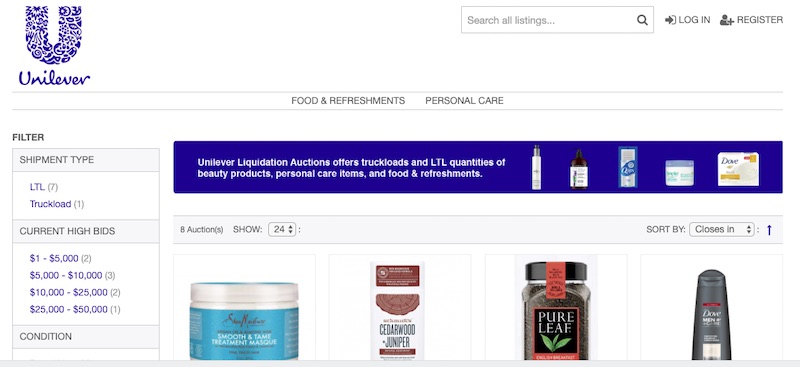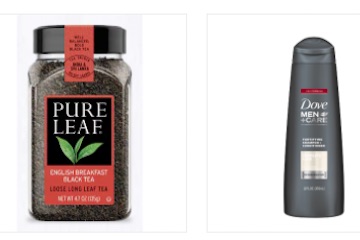“Ecommerce Briefs” is my occasional series on news and developments that impact online merchants. In this installment, I’ll report on Unilever’s new B2B liquidation site, Amazon’s holiday shipping delays, Shopify’s holiday shopping statistics, and the troubles of Jumia, the African ecommerce marketplace.
Unilever’s Liquidation Marketplace

The new Unilever Liquidation Auctions uses the B-Stock platform. Sellers to date include leading consumer brands.
Unilever has partnered with B-Stock — an auction platform for unsold inventory — for a B2B marketplace of new, excess merchandise. Unilever Liquidation Auctions offers brands such as AXE, Dove, Suave, Nexxus, Vaseline, and Q-Tips in bulk quantities to qualified U.S. business buyers.
More brands will be added in the beauty, personal care, and food and refreshment categories. The marketplace offers inventory in both truckload and less than truckload quantities.
B-Stock offers services for both enterprise and small business companies. Most buyers on the B-Stock auction platform are retailers. However, large retailers are also sellers. Examples include Best Buy, Lowe’s, Office Depot, and Walmart. Unilever will bring GE Appliances and Whirlpool in the auction space as sellers. Amazon liquidates products through the B-Stock platform, too.
Amazon Doesn’t Deliver
This is the first holiday season that Amazon isn’t relying on FedEx for ground shipments as FedEx discontinued the partnership last summer. Additionally, this is the first year that Amazon promises free one-day or two-day delivery to most Prime customers. This, in combination with adverse weather across much of the country over the Thanksgiving holiday, contributed to many delays.
Divulging a little-known fact, Amazon told customers that Prime’s one-day and two-day shipping timeline starts when an item leaves a warehouse, not when an item is ordered. Amazon sellers were also affected, resulting in a lively discussion on Amazon Seller Central. Here is a typical comment:
Just noticed that they removed delivery date windows for all my FBA listings. I too bought something FBA on Tue and the delivery promise was next Monday. I bet they are not committing to 1 or 2 day promises now for the holidays.
Amazon’s standard reply to customer complaints was, “We’re sorry for the wait! As a result of high order volume, delivery estimates for some orders may be longer than normal.”
Ironically, Amazon cut back on its use of FedEx, UPS, and USPS several years ago because those companies could not deliver packages on time.
Shopify’s Black Friday through Cyber Monday
Shopify reported that merchants using its ecommerce platform had excellent results for the November holidays.
- The number of purchases totaled 25.5 million compared to 16 million in 2018.
- Global sales totaled $2.9 billion, up from last year’s $1.8 billion, representing merchants in roughly 175 countries.
- The average U.S. cart value was $85.88.
- Sixty-nine percent of sales came from a mobile device.
- The most popular product categories were apparel and accessories and health and beauty.
- Overall year to date, Shopify merchants have experienced a 48 percent increase in sales in the U.S. since last year.
Jumia Retrenches
This week Jumia, the pan-African ecommerce company, announced it has closed its food and drink delivery service business Jumia Foods in Rwanda, just weeks after it totally exited Cameroon and Tanzania, according to the Financial Times.
Jumia has also scaled back business in Nigeria, its largest market. The company now operates in only 11 of Africa’s 54 countries. The former unicorn (attaining $1 billion in value) has seen its share price fall nearly 90 percent from its high after listing on the New York Stock Exchange in April. Shares, which reached $49.77 just after the IPO, have fallen to $4.96 as of December 11. Jumia appears to be pivoting towards becoming a fintech company, focusing on its Jumia Pay payment system.
The closures highlight the complexities of operating an ecommerce business across a continent with weak infrastructure and deficient logistics. Jumia’s fulfillment costs rose 63 percent in the first three quarters of 2019, versus a revenue increase of only 28 percent.
Jumia has incurred more than $1 billion in losses since launching in Nigeria in 2012. It is facing increased competition from Amazon, which can deliver goods quicker and at a lower cost. Also, small sellers on Instagram and other social platforms are beginning to gain traction in Africa.







